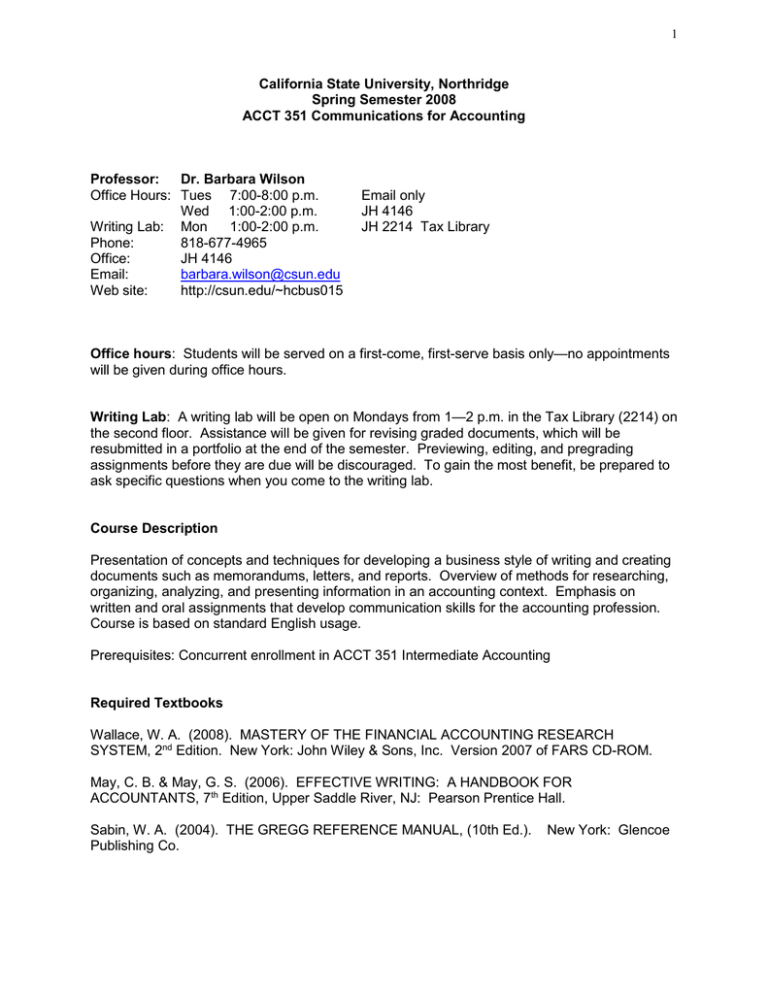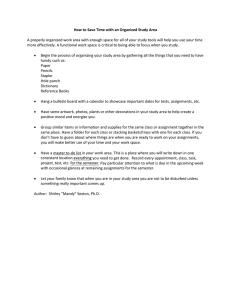
1
California State University, Northridge
Spring Semester 2008
ACCT 351 Communications for Accounting
Professor:
Dr. Barbara Wilson
Office Hours: Tues 7:00-8:00 p.m.
Wed 1:00-2:00 p.m.
Writing Lab: Mon
1:00-2:00 p.m.
Phone:
818-677-4965
Office:
JH 4146
Email:
barbara.wilson@csun.edu
Web site:
http://csun.edu/~hcbus015
Email only
JH 4146
JH 2214 Tax Library
Office hours: Students will be served on a first-come, first-serve basis only—no appointments
will be given during office hours.
Writing Lab: A writing lab will be open on Mondays from 1—2 p.m. in the Tax Library (2214) on
the second floor. Assistance will be given for revising graded documents, which will be
resubmitted in a portfolio at the end of the semester. Previewing, editing, and pregrading
assignments before they are due will be discouraged. To gain the most benefit, be prepared to
ask specific questions when you come to the writing lab.
Course Description
Presentation of concepts and techniques for developing a business style of writing and creating
documents such as memorandums, letters, and reports. Overview of methods for researching,
organizing, analyzing, and presenting information in an accounting context. Emphasis on
written and oral assignments that develop communication skills for the accounting profession.
Course is based on standard English usage.
Prerequisites: Concurrent enrollment in ACCT 351 Intermediate Accounting
Required Textbooks
Wallace, W. A. (2008). MASTERY OF THE FINANCIAL ACCOUNTING RESEARCH
SYSTEM, 2nd Edition. New York: John Wiley & Sons, Inc. Version 2007 of FARS CD-ROM.
May, C. B. & May, G. S. (2006). EFFECTIVE WRITING: A HANDBOOK FOR
ACCOUNTANTS, 7th Edition, Upper Saddle River, NJ: Pearson Prentice Hall.
Sabin, W. A. (2004). THE GREGG REFERENCE MANUAL, (10th Ed.).
Publishing Co.
New York: Glencoe
2
3
Learning Objectives
conduct research using Internet databases for accounting and business;
apply appropriate documentation;
develop a business writing style by writing letters, memos, and reports based on
accounting situations;
create effective visual aids;
develop formal presentation skills; and
develop team building and interpersonal communication skills
Late Assignments
Late papers will not be accepted. Assignments are due at the beginning of the class meeting,
and will be collected after attendance is taken. Papers will not be accepted after class begins.
Any student who misses the deadline will receive a zero for the assignment.
Written Assignments
All written assignments are expected to be properly documented and formatted using style
guides on my web site. Evaluation of written assignments will be based on Standard English,
language skills, organization, content, and analysis. See Accounting Communications
Evaluation Form for Written Documents.
Course Evaluation
The + and - system will be used for passing grades. The final course grade will be calculated
using the following percentages:
Amelia Emerson revision
Individual Assignment I
Individual Assignment II
Individual Assignment III
Individual Assignment IV
Group Report
Oral Presentation
Portfolio
Peer Reviews
Final Exam
05
10
10
10
10
10
10
10
05
20
Final course grades will not be communicated in e-mail messages or on my web site. Use the
Final Course Grade Calculation Form on my web site to record your grades and track your
progress.
Student Name
4
Use the same form of your name that is in the university computer system. If the name on a
document does not appear on my class roster, no credit will be given.
5
Attendance
Students are expected to attend all class meetings, arrive on time, and read assignments prior
to class. Your final course grade will be reduced by a plus or minus for every two absences.
Two tardies equal an absence. Attendance will be taken at the beginning of each class.
Once class begins, students are expected to remain in class.
Assessments
Assessment grades do not count; they merely provide the students with an indication of their
skills at the beginning of the semester. Two assessments are used for this course: a written
document and a diagnostic exam. The Amelia Emerson letter will be handed back on the first
day of class. Students will receive an assessment grade plus feedback for revising. This will be
your first written assignment—to revise the letter. The revised grade counts.
Scores on the diagnostic exam from ACCT 350 will be announced during the first week of class.
In addition, all students will submit their completed Gregg Worksheets during the first class
period of the semester. Students who do not complete the Gregg Worksheets will receive a
plus or minus reduction in their final course grade. During Week 6, all students will retake the
diagnostic exam. Students with scores below 42 will retake the exam during Week 13. Any
student scoring below 42 on the retake will receive an Incomplete for the course and will not be
able to register for ACCT 352.
An answer key for the Gregg Worksheets is available online through the Oviatt Library. Go to
the CSUN library web page and click on the following link: Course Reserves. Fill in Wilson.
The call number for the answer keys is RBR 33039 and the password is 3539.
Individual Assignments
Your accounting professor and your communications professor will grade Assignments I-IV.
The technical grade from your accounting professor will be incorporated into your writing grade
for communications. The accounting content must be technically correct and effectively
communicated.
Two copies of your assignment must be turned in—one to your accounting professor and one to
your communications professor. Students who fail to turn in a copy to each professor will
receive a zero. Be sure to submit identical copies of the assignment in both courses.
Group Assignment
Groups of three will be formed by the students. During Week 4, students will hand in a form
listing group members with their phone numbers and email addresses.
6
A group report will be completed outside of class and will include planning, researching, writing,
and editing responsibilities. Each group’s progress will be assessed during Week 13.
Nonparticipating group members will be identified and will receive an F on the group report.
Formal Oral Presentation
Each group will give one formal presentation. Formal presentations will be 20 minutes including
questions and answers. Evaluation will be based on organization, content, and delivery. Each
group member will be graded individually. An absence means a zero.
Groups will meet the oral presentation requirement by presenting an individual assignment OR
the group research paper. On the week before the due date for three case assignments, one or
two selected groups will give a formal presentation. Since all students will prepare the writing
assignment individually, presenting groups will work collaboratively to prepare a presentation of
the material. At the end of the semester, groups who have not presented a case will present the
results of their research from their group report.
On the presentation day, each presenting group will be assigned a Challenge Group and a Peer
Review Group. The Challenge Group will be responsible for asking questions during the Q&A
session. Questions should be focused on the conclusions and recommendations presented by
the group. In other words, questions should be directed towards the reasoning and technical
material that supports the presenting group’s decisions. The Evaluation Group will identify the
strong presentation skills and what needs to be improved using the Oral Presentation
Evaluation Form. The Challenge and Evaluation Group members will receive 0-2 peer review
points.
On the date of the oral presentation, presenting students will evaluate their fellow group
members’ participation using the Team Evaluation Feedback Form.
Informal Presentations
Each group will prepare an activity to highlight an important concept from one of the chapters of
your accounting communications textbook. Groups must engage the class in a learning activity.
Do not prepare PowerPoint presentations, chapter reviews, or lectures. Appropriate activities
include quizzes, demonstrations, role modeling, games, exercises, etc. See my website on the
assignment page for Chapter Presentation Strategies.
The purpose of the informal presentation is to present to the class in a nongraded situation,
distinguish between formal and informal presentation styles, and learn an alternative approach
to studying a chapter.
All group members are expected to participate. Nonparticipating members will receive a plus or
minus reduction in their final course grade.
7
Peer Reviews
During class time, students will peer review fellow students’ rough drafts for each individual
assignment one week prior to the due date. A peer review feedback form will be developed for
each individual assignment along with the prompt. Students will use the suggestions and
comments from the peer review feedback forms to make final revisions to their document. On
the due date, students will attach the peer review feedback forms and the rough draft to their
final document.
Students will be evaluated on how well they critique a rough draft, identify weaknesses in the
writing, and make suggestions for improvement. A score of 0-2 will be given for each peer
review—a 0 means you made no suggestions to improve major weaknesses, a 1 means you
made at least one good suggestion, and a 2 means you critically made suggestions for
improvement.
Portfolio
Students will revise each of their graded assignments based on comments and feedback.
Papers should be submitted in a two-pocket folder with the graded assignments (351 and
351COM) on the left-hand side and revised papers on the right-hand side. The student’s name,
section number, and course meeting time should appear on the front of the folder along the fold
line. Use a light colored folder.
Selected portfolios will be evaluated by a team comprising accounting faculty and one outside
faculty member.
Final Exam
A comprehensive exam will be given on oral and written communications concepts with
true/false and multiple choice questions. Suggested topics to study will be given during the last
class meeting. There will be no makeup exams.
Caveats
Course assignments may be subject to change as the semester proceeds. Students are
responsible for information presented in the syllabus and any changes announced during class.
Students who miss class should obtain class notes from a fellow student. After you complete
required readings and review class notes, we will answer questions during office hours.
Do not e-mail drafts of your assignments for feedback.
Any disturbance in class that affects the learning environment will be cause for dismissal from
that class.
8
Department Policy
Starting fall 2005, students must earn a grade of “C” or higher in each upper
division business and accounting course in order to graduate with a BS in
Accountancy. Students who earn less than a “C” will be permitted to repeat the
course only once and only if/when a seat becomes available. There is no
guarantee that a student will be able to repeat a class in the semester desired.
State and local fire codes prevent classes from exceeding room capacity.
Students must have an assigned seat with desk space (i.e., students will not be
permitted to sit on the floor or in an empty chair in order to repeat a course.)
Disabilities
Students with disabilities must register with the Center on Disabilities and
complete a services agreement each semester. Staff within the Center will verify
the existence of a disability based on the documentation provided and approve
accommodations. Students who are approved for testing taking
accommodations must provide a proctor form to their faculty member signed by
a counselor in the Center on Disabilities prior to making testing arrangements.
The Center on Disabilities is located in Bayramian Hall, Room 110. Staff can be
reached at (818-677-2684).




